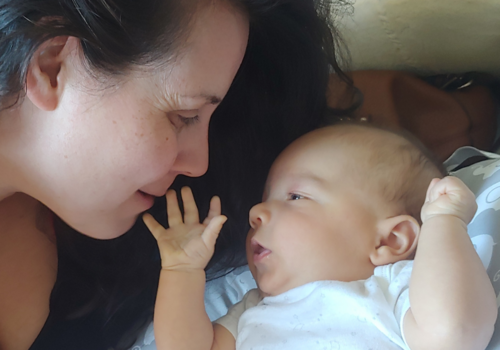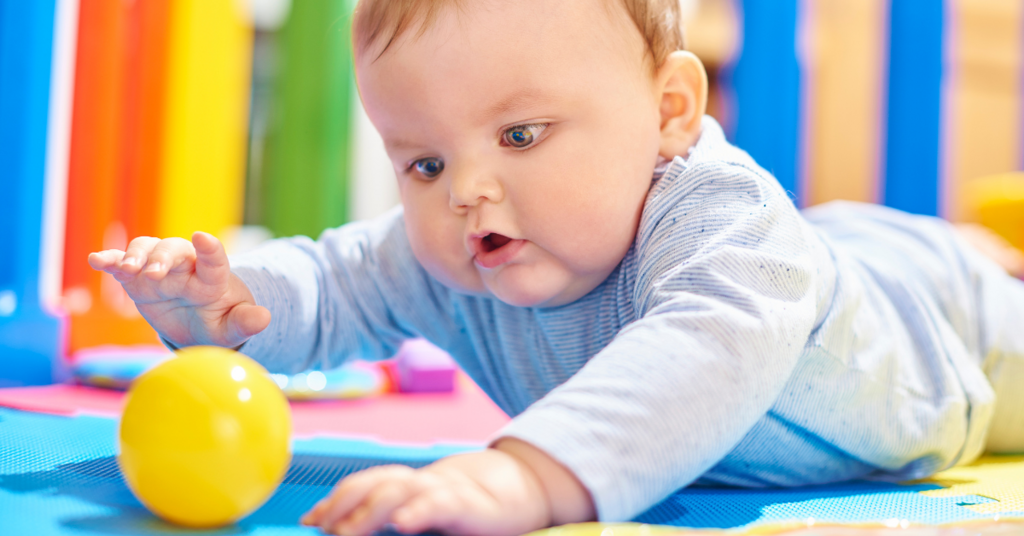
The time a baby spends on screens can have a lot to do with the mother’s mental health.
Two new studies in JAMA Pediatrics show an association between babies’ screen use and delays in their development, especially in the areas of learning to speak and problem-solving.
The more screen exposure, the more delays.
In the studies—both from Japan—the states of mind of the mothers affected the time their babies spent using digital devices.
“Lower developmental scores were associated with increased screen time in children with maternal psychological distress,” the first study states.
Postpartum Depression and Anxiety are Widespread
Depression is a vexingly common disorder among pregnant and new moms. 1 in 8 has depression or anxiety severe enough to require medical care, according to the U.S. National Institute of Child Health and Human Development.
A mother may be diagnosed with postpartum depression or anxiety if her feelings of sadness, emptiness, fear, or worry last for weeks and interfere with the tasks of everyday life.
Turning to screens is how some depressed and anxious parents cope.
As one mom recalls from before she was treated for postpartum depression, “I sat [my infant son] in a bouncy seat in front of the TV to get things done and take my mind off my anxiety and show something was getting accomplished.”
Many Parents Still Unaware of Screen Time Guidelines
The World Health Organization advises parents that babies should not have exposure to screens. The American Academy of Pediatrics makes an exception for video calls with loved ones.
Recommendations are based on years of evidence that babies learn to speak through back-and-forth face-to-face interactions with loved ones and other people. For optimal brain development, babies also need the freedom to move and explore their surroundings by using all their senses, not just the few needed to swipe or watch a screen.
Yet, a 2022 review of studies from around the world reveals that 3 out of 4 children under age 2 exceed screen time guidelines.
Another 2022 study finds that many parents aren’t aware of the guidelines. Even when they are, they don’t know the exact recommendations.
But mothers who did learn the guidelines “allowed significantly less screen time for infants than those who were unaware.”
Mindfulness Eases Stress
In another encouraging finding, a Spanish study in JAMA Network Open shows that mindfulness can improve a new mom’s mental health and boost her child’s brain development.
Researchers trained one group of pregnant women in mindfulness-based stress reduction.
The findings: “the stress reduction program was associated with improvements in anxiety, well-being, and stress biomarkers compared with the other study groups.”
Children of the trained moms also had “significantly improved child neurodevelopmental outcomes at age 2 years.”
Becoming a Mindful Parent
You don’t have to take a course to practice mindfulness.
A mainstay of MBSR is to focus on your breath. Four Square is a simple breathing technique you can do even in the midst of a busy household.
To begin Four Square, stand or sit quietly with eyes closed if you can. Breathe in slowly for a count of four seconds. Hold your breath for another 4 seconds, exhale slowly for 4 seconds, and then hold your breath for another 4. Repeat at least twice, if possible.
Shark Fin is another simple self-calming technique you can easily teach your children.
Other Factors Affecting Baby Screen Time
In the September 2023 Japanese study, babies who had more screen time and did more poorly on developmental tests had been read fewer books and spent little time outdoors. They were more likely to have no siblings and not attend daycare. Their mothers typically had lower education and income levels.
On the Screen Time Stories podcast, host Julie Tripp and Durable Human founder Jenifer Joy Madden shared no- or low-cost ways for parents to manage stress:
Play soothing music. Calm your nerves by putting on something quiet and peaceful. Or—
Get up and dance. Moving to a happy tune can help you and your kids literally feel more upbeat.
Go outdoors. Stepping into the breeze and sunshine can snap almost anyone out of a funk. Getting back to Nature does wonders for a human animal’s psyche.
Ask for help. Trying to go it alone can be a losing battle. People can only help if they know you need it.
How to Stay Screen Free When Your Attention Must be Elsewhere

At times when you need to take a work call or be otherwise occupied when you’re with your baby, set up a YES space—a concept popularized by Speech-Language Pathologist Alyssa Loberti. The YES space allows your little one to play safely without a screen for entertainment.
To set up a YES space, place your baby in a playpen or play yard and add soft, safe toys. This is a good baby toy list to choose from. That way, you can get your work done while your baby moves around and safely amuses him or herself.
What Society Can Do to Reduce Baby Screen Time
At present in the U.S., households under the poverty line spend about one third of their income on childcare. In all 50 states, the price of center-based care for two children exceeds average rent payments by at least 24%.
Americans can support families by keeping up with proposed legislation and exercising the right to advocate and vote.
For instance, House lawmakers from Illinois, Oregon, Wisconsin, Nevada and Virgin Islands have joined Senate colleagues to sponsor the Build Childcare for a Better Future Act. The law would give grants to U.S. states, tribes, and territories to address their specific child care needs.
Don’t Wait if You Can’t Shake That Awful Feeling
If you live in the U.S., you know to call 911 in an emergency. You can now get free, confidential mental health help by calling or texting 988—the Suicide and Crisis Lifeline. Trained 988 counselors are there 24/7 to lend an ear and put you in touch with mental health resources in your local area.
If you’re pregnant or have a new baby and have been feeling down, worried, or wrenchingly lonely for weeks, take it from moms who’ve come back from postpartum depression and anxiety: don’t wait to get help.
Talking to a healthcare professional or calling 988 is a 2-fer—good for your own and for your baby’s well-being and mental health.
About the author: Jenifer Joy Madden is a certified digital wellness educator, health journalist, and founder of DurableHuman.com. She is the mom of three grown up durable humans, one of whom has a little one in training.




Love it! Great summary and resources, thanks!